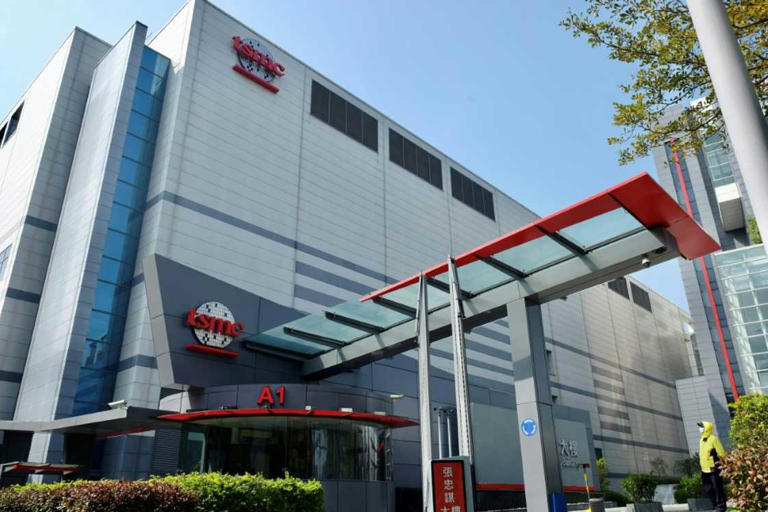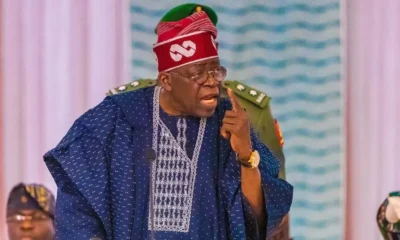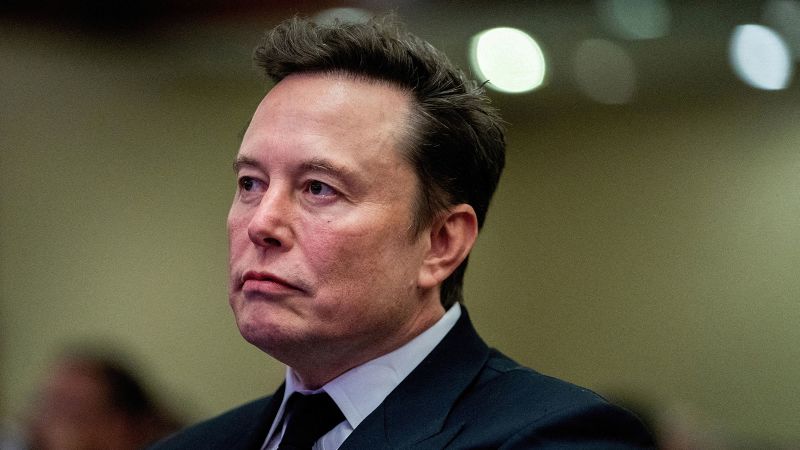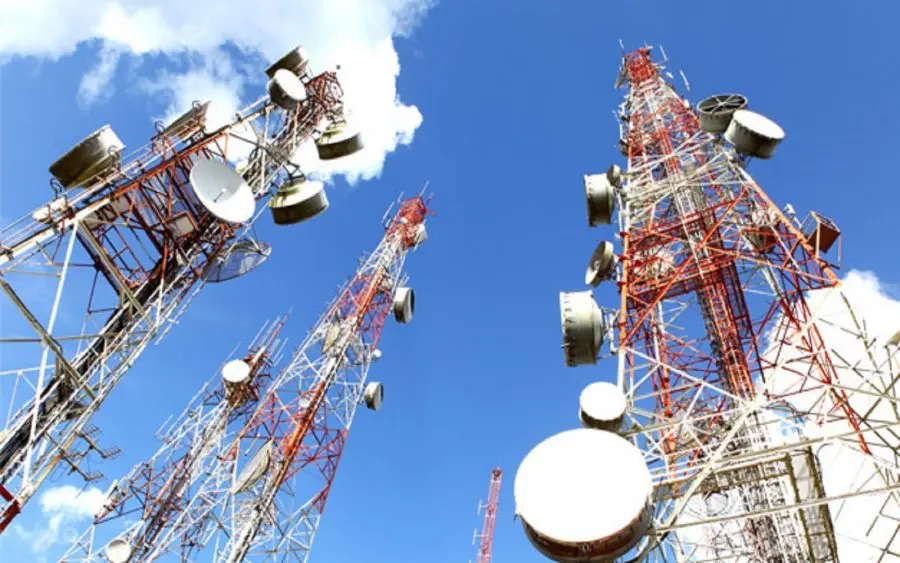Tech
Taiwan’s TSMC stops shipments to client after chips sent to Huawei
Published
6 months agoon
By
Ekwutos Blog
Taiwanese chipmaking giant TSMC halted shipments to a customer this month after its semiconductors were sent to China’s Huawei, a Taipei government official told AFP, potentially breaching US sanctions.
Taiwan Semiconductor Manufacturing Company is the world’s largest contract manufacturer of chips used in everything from Apple iPhones to Nvidia’s cutting-edge artificial intelligence hardware.
Huawei, the world’s leading equipment maker for fifth generation mobile internet networks, has been embroiled in a tech war between Beijing and Washington.
The United States slapped sanctions on Huawei in 2019, and expanded them the following year, over fears its technology could be used for Beijing’s espionage operations. Huawei denies the allegations.
The sanctions cut Huawei off from global supply chains that gave it access to the US-made components and technologies crucial to manufacturing powerful AI systems.
The restrictions prevent TSMC from selling semiconductors to Huawei.
But, TSMC discovered on October 11 that chips made for a “specific customer” had ended up with the Chinese company, a Taiwanese official with knowledge of the incident told AFP on the condition of anonymity.
TSMC “immediately activated its export control procedures”, halting shipments to the customer and “proactively” notifying US and Taiwan authorities, the official said.
In a statement on Wednesday, TSMC said it was a “law-abiding company” and had not supplied Huawei since mid-September 2020 in compliance with export controls.
“We proactively communicated with the US Commerce Department regarding the matter in the report,” TSMC said, apparently referring to media reporting of the incident.
“We are not aware of TSMC being the subject of any investigation at this time.”
Taiwan’s economic ministry told AFP on Thursday that TSMC had informed them about the incident, but had not identified their client.
“There was already an interaction and a contractual partnership in place, so it’s an old client,” the ministry said.
They had been a client since before the 2020 deadline for companies to comply with the export controls, and “no shipments have been made since October 11”, it said.
Self-sufficiency
Bloomberg reported Tuesday that Canadian research firm TechInsights had found an advanced processor made by TSMC inside Huawei’s latest AI chip.
Huawei did not respond to AFP’s request for comment.
The company told Bloomberg that it hadn’t “produced any chips via TSMC after the implementation of the amendments made by the US Department of Commerce” to its trade restrictions targeting Huawei in 2020.
In response to US export restrictions, Beijing has turbo-charged a drive for self-sufficiency in chips, with plans to pump billions of dollars into the sector.
Huawei last year unveiled the Mate 60 Pro, a high-performance smartphone equipped with a chip that experts say would be impossible to produce without foreign technologies.
That sparked debate about whether attempts to curb China’s technological advancements have been effective.
You may like


VATICAN PUBLISHES PROGRAMS FOR NINE DAYS MOURNING OF POPE FRANCIS


Jude Okoye released after 2 months in jail


Killings: Enough is enough – Tinubu issues marching order to NSA, Service Chiefs


Flight disruption imminent over NiMet workers’ strike


This Gallant Police Officer Sh0t himself Dead at the residence of the VIP he was attached to In Portharcourt.


Hon. Oluwole Oke Resigns from PDP After 24 Years in House of Representatives
Tech
US: ‘It’s time for the virus mind to die’ – Elon Musk slams transgender Americans
Published
3 days agoon
April 21, 2025By
Ekwutos Blog
United States of America tech billionaire, Elon Musk has taken a swipe at transgender people, saying, ‘It is time for the virus mind to die.”
Elon Musk, who is the lead at the Department of Government Efficiency under President Donald Trump’s administration, made this known in a terse statement replying to a Behavioural Risk Surveillance Survey by the Centre for Disease Control on the rising percentage of US adults identifying as transgender.
According to the survey data released on X Sunday by a popular American author, John LeFerre, US adults identifying as transgender surged by year of birth.
The data means that adults identifying as transgender have been on a steady spike, especially those with birth dates from 1990 to 2005.
Reacting, Musk described the trend as a “woke mind virus in action.”
“Now, it is time for the mind virus to die,” he wrote on his X account.
His comments come after Trump’s administration showed a tough stance against transgender people since his second term inauguration in January 2025.
Recall that Trump signed an executive order in February 2025 banning biological men from women’s sports.
In a related development, on Wednesday last week, the United Kingdom Supreme Court ruled that the definition of a woman under the country’s equality law refers to biological sex.
Ekwutosblog reports that the ruling had sparked transgender protests in parts of the UK.
Tech
Gov Soludo is a greater supporter of Innoson group but our Office in Anambra was demolished without pre-notification from government— Innoson Group
Published
6 days agoon
April 18, 2025By
Ekwutos Blog
Innoson Vehicle Manufacturing (IVM) has expressed displeasure over the partial demolition of its Head Office, situated on the Owerri-Nnewi road.
Mr Cornel Osigwe, Head of Corporate Communications at Innoson Group, who confirmed the demolition to newsmen, said that there was no pre notification ahead of the demolition which took place on Wednesday.
He claimed that the office perimeter fence, some offices, stair case and the company’s showroom were affected by the partial demolition.
According to him, there was no pre notification ahead of the demolition; it came to us as a surprise.
“We did not know that the building itself was marked for demolition and if it was marked, they should have given us time to relocate.
“The staff were working and they just saw the demolition vehicle demolishing the building while work was going on.
“Some of our staff were trapped in the building, it took the efforts of our other staff to rescue those that were trapped while over 20 vehicles were also trapped.
“A day before the demolition, there was an announcement that there was going to be a demolition and they were going to give one week for the houses that were marked for demolition to relocate.
“The company was not aware that the company was marked for demolition, and even if it was aware.
“There have been a public announcement that all the marked buildings have one week to relocate, but all those things were not considered
“There were other buildings that were close to the head office and marked for demolition were not demolished but they came straight to our building and demolished it, making us to wonder if there was another ulterior motive to it,” he said.
“Gov. Charles Soludo of Anambra has been a great supporter of Innoson Vehicle and Innoson has been a great supporter of the state government.

“But the way and manner that everything happened makes us to wonder if the state government is aware that those handling the demolition have personal vendetta against the company,” he added.
Tech
They only know how to drain data’ – Telecom consumers lament tariff hike, poor network
Published
1 week agoon
April 14, 2025By
Ekwutos Blog
Some telecommunication services consumers in the Federal Capital Territory, FCT have urged Mobile Network Operators to improve their services to match the recent hike in their tariffs.
They made the call in separate interviews with NAN on Monday in Abuja.
The subscribers said despite the increase in subscription rates mobile networks could remain epileptic for hours.
In a publication dated February 6, 2024, the Executive Vice-chairman of the Nigerian Communications Commission, Dr Aminu Maida, said that the commission would hold service providers accountable for poor service delivery.
Mr Ogah Paul, one of the subscribers said he had enough data on his network but could not access the internet because of the epileptic network.
He urged service providers to fix the problems surrounding the poor services.
“The only thing they know is to drain data without any good service delivery. I feel like crying because of a problematic network. I have been receiving server errors since morning.
“To even download and watch a video sent to me since, takes me almost one whole day. “I wonder if members of staff of the service providers are enjoying the service they render to us.
“We cannot make calls, access the internet or even receive calls,’’ he said.
According to him, unfortunately, the network providers put up some of the best adverts about their products and services which they cannot meet.
Mr Victor James, another subscriber said he had enough data but was not able to use it to his satisfaction.
“Why does their data plan not reflect immediately when you buy data? Sometimes it takes as much as 24 hours to reflect.
“I am tired of this. The network is really bad. I have enough data but I cannot use it the way I want.
“I hope the issues get resolved as soon as possible so that I can access my data without further delay,” he said.
However, Ms Josephine Tanko, told NAN that she had no problems with her network providers.
“It is fast and reliable. I think it is the network that gives the best internet speed and quality.
“It will always be my best that is why I will always choose it over any other network,” she said.
She called on networks that did not meet their subscriber’s expectations to ensure that they improved their services.

VATICAN PUBLISHES PROGRAMS FOR NINE DAYS MOURNING OF POPE FRANCIS

Jude Okoye released after 2 months in jail

Killings: Enough is enough – Tinubu issues marching order to NSA, Service Chiefs
Trending

 Trending6 months ago
Trending6 months agoNYA demands release of ‘abducted’ Imo chairman, preaches good governance
- Business6 months ago
US court acquits Air Peace boss, slams Mayfield $4000 fine

 Politics6 months ago
Politics6 months agoMexico’s new president causes concern just weeks before the US elections
- Entertainment6 months ago
Bobrisky transferred from Immigration to FCID, spends night behind bars
- Entertainment6 months ago
Bobrisky falls ill in police custody, rushed to hospital

 Politics6 months ago
Politics6 months agoRussia bans imports of agro-products from Kazakhstan after refusal to join BRICS

 Politics6 months ago
Politics6 months agoPutin invites 20 world leaders
- Politics1 year ago
Nigerian Senate passes Bill seeking the establishment of the South East Development Commission.

